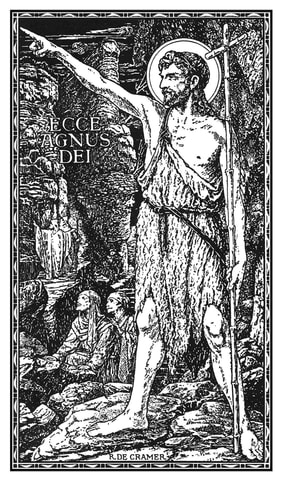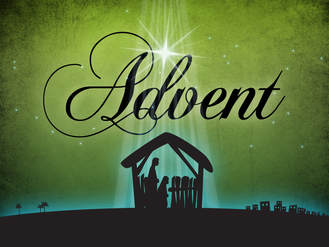 John 1:6-8, 19-28 ‘He came as a witness to speak for the light’ (John 1:7) Yesterday afternoon we celebrated the first of our Christingles; earlier this morning we have lit the third candle on the Advent Wreath; and tonight we will come together for our service of Carols by Candlelight. All these liturgies place a very strong emphasis on the belief that Jesus is the Light of the World – a light which darkness cannot overcome (Cf. John 1:5). And as with our candles (in our hands, on top of our oranges, or on the Advent Wreath) we scatter the darkness that surrounds us, we remind ourselves and the world that only through the Light of Christ we are able to see clearly. These candles – whether wonky, propped up with tin foil, or blessed – are only a token witness to that bright, unquenchable, searing, and cheerful light that is Christ. And today’s gospel presents us with an even better example of what it means to be a witness to Jesus as the Light of the World. St John the Baptist was unquestionably a peculiar figure by any standard. As we heard last week, he wore clothes made of camel’s hair, he fed on insects and wild honey, he was often rather forthright in his speech, and although he lived in the desert he attracted a huge number of people who wanted to be baptised by him. But, what we should find even more remarkable is the way in which we are introduced to him by John the Evangelist. A man came, sent by God. His name was John. He came as a witness, as a witness to speak for the light, so that everyone might believe through him. This description of John the Baptist is an integral part of the gospel’s first few verses where Jesus is proclaimed as the Word of God, the Light of Life, and the Light of the World. And John’s ministry – in fact his whole life – was so intertwined with Jesus’ that the evangelist has to specify that John the Baptist ‘was not the light, only a witness to speak for the light’ (John 1:8). Like Moses, Isaiah, and the other prophets, John was sent by God to point the way to the Messiah, and to bring a testimony about the true Light which was about to be revealed to the world in the person of the Lord Jesus. But, as the last of the prophets, as a cousin of Jesus, and as a peculiar figure, it would be easy to look past John the Baptist and to think that he had nothing to teach us. Yet, I strongly believe that this short description of John could and should be a fitting description for every Christian – if we only let our lives become so intertwined with the life of Jesus that others would find it difficult to separate our character from his. A man came, sent by God. His name was John. He came as a witness, as a witness to speak for the light, so that everyone might believe through him. Like our candles we might be a bit wonky in our religious life (maybe not propped up with tin foil and stuck in an orange), but we are all, every one of us, most certainly blessed, and so like our candles we have to bear witness to Jesus as the Light of the World. Then, how good it would be if people were to say of us, “There was a man (or woman) sent by God. His name was … He came as a witness, as a witness to speak for the light, so that everyone might believe through him”? How good would it be, if with our simple faith we could bring the light of Jesus to others, so that those around us might have faith through us? John the Baptist led a rather odd life, but we do not need to move to the wilderness, and star eating insects, to bear witness to the Light of Jesus. We just have to put into practice the simple advice found in our second reading; ‘Be happy at all times; pray constantly; and for all things give thanks to God’ (1Thess 5:16). Our society, perhaps now more than ever, needs happy and positive people whose joy comes from knowing Christ; it needs people who take prayer and the sacraments seriously; and it needs people who know how to be grateful to God for the innumerable blessings we receive from his hand… If we do this, we will be not only genuine Christians, but we will set the world alight with the true Light that is Christ the Lord.
0 Comments
 Mark 13:33-37 ‘What I say to you I say to all: Stay awake!’ (Mark 13:37) In our society New Years’ celebrations are usually quite cheerful affairs, sometimes featuring a staggering amount of food, drink, and fireworks; all of this in order to break as much as possible with the old, and usher in the new. And once the partying ceases, we make improbable New Year resolutions wishing to become that new person who is as different as possible from our old self. Then, perhaps, we might find it odd that the new Christian year opens by repeating the gospel message we have been hearing for some time now. Last week the Feast of Christ the King brought the Sunday cycle of the Christian year to an end with the reminder of Jesus sure return as Lord and Judge of all creation. But as today we officially begin a new liturgical year, Mark’ short parable – about the man travelling abroad who leaves his servants in charge of his household – takes us back, not only to last week, but also to a number of other parables we have read recently. And it’s meaning, like that of all those previous parables, is quite clear; when we will find ourselves face to face with Jesus, he will judge each one of us according to our deeds; according to our trustworthiness and commitment to him. But, perhaps, we may find it even more surprising that the new Christian year should open with sombre notes and reduced singing, rather than with a loud bang and cheerful noise. In this, Advent looks a little bit like Lent. Both Advent and Lent are marked by a pressing call to prepare ourselves for that which it to come. Both of these seasons are defined by the colour purple (or violet), the colour of penitence, introspection, and repentance; and the singing of the Gloria, like the flowers that usually adorn our church get put away. So much for New Year cheerfulness! Even the Scripture readings set before us are geared up, not so much towards the joy of Christmas, but rather towards the more sobering thought of being confronted by our faults. This morning the prophet Isaiah holds up a mirror to us all, and gives us a talking to, as it were. ‘We were all like unclean people, - all that integrity of ours like filthy clothing. We have all withered like leaves and our sins, like the wind, have carried us away.’ (Isaiah 64:6) And Jesus then says, ‘What I say to you I say to all: Stay awake!’ (Mark 13:37) This combined message is simple enough and yet difficult to hear at a time when we are all so busy with shopping, parties, and making everything just perfect in time for Christmas. Nevertheless, Advent calls us to assess candidly the state of our society so that we might wake up from injustice, consumerism, and selfish behaviours to prepare our world for the coming of Jesus, and so be found ready to meet him when he will come to us as our judge. We must stay awake in a spiritual sense, so that through prayer and good works, we may be prevented from sleepwalking into the hidden snares of vice. The collect from the BCP for this season helps us to put the Advent message into prayer… Almighty God, give us grace to cast away the works of darkness and to put on the armour of light, now in the time of this mortal life, in which your Son Jesus Christ came to us in great humility; that on the last day, when he shall come again in his glorious majesty to judge the living and the dead, we may rise to the life immortal; through him who is alive and reigns with you, in the unity of the Holy Spirit, one God, now and for ever. Amen. |
Archives
June 2020
Categories
All
|
 RSS Feed
RSS Feed


